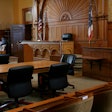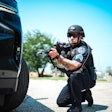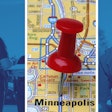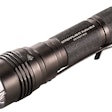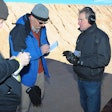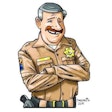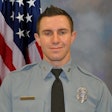It was a typical December 31st for Great Bend, Kan., police officers, with the usual rollouts to domestic calls and bar checks. And as New Year's Eve segued into New Year's morn, the party complaints began to come in. They continued through the early morning hours, culminating with a
4:15 a.m. call of a pedestrian hit-and-run.
Upon their arrival, Great Bend's finest were greeted by the sight of shattered trees and dented cars, as well as that of a man writhing in pain in the street. It didn't take long for the officers to figure out that no mere hit-and-run accident accounted for the impromptu landscaping and the man with the broken leg. The outstanding motorist, one James Robert Johnson, had intentionally run over his best friend in a fit of jealous rage.
A former gang member-cum-drug abuser, Johnson was no stranger to the Great Bend Police Department, and it didn't take long for a probable address on the man known to locals as "Jim Bob" to be broadcast over the police frequency.
Alley Sweep
Officer Rod Weber, who'd been monitoring the call while writing some of his own New Year's generated paperwork, decided to roll to the address.
Once in the area, Weber was directed to approach the house through an alley to the rear of Morton Street. Using his alley sweeps, the 10-year veteran officer found what he was looking for just three houses from the street.
The Johnson house and its offset garage sat away from the alley bordered by a six-foot-tall fence. Access to the property from the alley was provided by a wooden gate large enough to accommodate the red Ford pickup truck Weber spotted in the yard. The fresh tire impressions in the alley's compacted snow suggested that the truck had recently been driven, and the tree bark embedded in its fender hinted strongly of its involvement in the vehicular assault.
Weber radioed Officer Emil Halfhill, who was familiar with the suspect, and asked him to swing through the alley to confirm that this vehicle was the same one that had been involved in the hit-and-run. Weber then continued through the alley and circled around the block.
Upon returning to the alley, he found Halfhill's unit parked with its alley lights and spotlight already trained on the pickup. Halfhill identified the truck as Johnson's, then told Weber that he spotted the back door of the house open and close, but he didn't see anyone emerge.
As the two officers approached the rear of the house, Weber heard yelling and screaming from inside. He started toward a window near the back door to more clearly discern what the commotion was about. As he drew near the house, the doorknob of the back door suddenly began to turn.
Shotgun at Low Ready
The door popped open, followed by the screen door. Weber reflexively drew his sidearm. He saw a man in the doorway holding a shotgun at the low ready.
Backlighting from the porch area gave Weber a clear view of the young man with the meth-head build, obviating the need for a flashlight. Instead, the officer trained his sidearm, a .40 caliber Glock 22, on the man's chest.
"Drop the gun!" Weber yelled. "Drop the gun!"
The officer's commands fell upon James Johnson's numbed ears. Instead, the slender man stood atop the porch wielding his pistol-gripped shotgun. A mere six feet separated the officer and suspect. Again, Weber ordered Johnson to drop the weapon.
But Johnson wasn't about to drop the Maverick Model 88. He screamed at Weber and Halfhill, addressing them in epithets and telling them to drop their guns and get off his property.
Weber fixated on the short barrel of Johnson's shotgun, mentally committing himself to fire his Glock if Johnson elevated the weapon to a certain level. Johnson's shotgun started to rise.
Weber yelled once more for the man to drop it.
The shotgun's barrel continued upward.
Weber fired.
And in that split second, Johnson fired back.
Officer Down!
Johnson's shotgun blast caught Weber just as he was in the middle of his double tap. Weber's first round nailed Johnson in the chest as high brass #4 shotgun pellets peppered the left side of his own abdomen. Reflexively, he fired his second round, which struck Johnson's right arm.
Johnson rolled off the porch.
For Weber, the pain was intense, though not debilitating. Still on his feet, and therefore still in the fight, he knew his number one priority was to find cover. He backpedaled for Johnson's pickup, but the snow compromised his traction and he found himself going ass over teakettle onto the ground. Pushing himself upright, he scrambled for the pickup, covering down its passenger side for the man he feared might pop up in the darkness.
From the cover of a nearby camper, Halfhill screamed into the radio, "Shots fired! Officer down!"
Off in the distance, every siren in the county seemed to activate, growing stronger with each passing second.
A Distinctive Sound
Crouching near the engine block of the pickup, Weber cradled his Glock between his legs, anchoring it against his knee to steady his aim as he covered down the passenger side of the pickup making sure that Johnson didn't round the back of the pickup on him.
From the relative safety of the pickup, Weber lay on the ground and inventoried himself. He knew he'd been hit, but didn't know how badly. He grabbed his stomach, feeling for any blood that might be seeping through his shredded uniform shirt. All he could detect was steam rising from the ballistic vest beneath.
He realized that his vest had done its job and done it well.
I'm good, he thought.
But looking beneath the pickup, he saw Johnson doing the same thing, grasping at his own chest in a bid to determine the extent of his injuries. Seeing Johnson down, but hardly out, Weber realized he was still in danger.
The officer got back to his feet, adopted a wide stance away from the pickup, and began slicing the pie around it, once again closing the distance between himself and Johnson. Sure that Johnson had rolled over to a recessed corner of the house near the back door, Weber moved to the end of the pickup bed to get a bearing on Johnson's whereabouts.
Just then, Weber heard a distinctive sound in terrifyingly close proximity, just beyond and below the visual plane of the pickup's tailgate. It was the sound of a shotgun being racked.
Crap, I'm vulnerable, he thought. I've screwed myself.
Seeking more effective cover behind the engine block of the pickup, Weber heard a second shotgun blast ring out. Looking beyond the pickup, he saw the shotgun resting atop the porch. Johnson's body lay in the snow below. Weber began a cautious approach.
"Where are your hands?" Weber demanded, "Show me your hands!"
But Johnson didn't move. Weber edged closer. Then he saw something that silenced him.
From Johnson's nose to his hairline, a portion of the man's head was gone: The man had shot himself.
Sirens in the distance reminded Weber of the officers trying to reach him on weather-slicked roads. Unable to get his own radio to work, he keyed Halfhill's telemic and advised responding units that the suspect was down and the situation had stabilized.
Blunt Trauma
A confluence of individuals descended upon the backyard, and Weber's primary concern became one of crime scene containment. He'd successfully fended off entries by Johnson's distraught babysitter and a couple of reserve deputies when two of Weber's peers, Officer John Reynolds and Dep. Kyle Reed, arrived on scene.
"Are you hit?" they asked.
"Yeah, I'm hit, but I'm fine."
Reynolds asked, "Did it go through?"
It never occurred to Weber that the shotgun pellets might have penetrated his vest. He knew his stomach hurt, but still had no clue how badly he'd been injured.
Reynolds and Reed started tearing Weber's uniform off, yanking away at buttons and belt keepers. Weber tried to calm the men down, but was stopped by Reynolds as he started to pull his vest up.
"No," Reynolds said, pulling the vest back down. "You're OK."
Belying his confident tone, Reynolds instantly got on the radio: "Get an ambulance here now. We've got an officer hit."
Weber was incredulous at Reynolds' request—he was sure that he hadn't been seriously injured. Then, pulling his vest up, he saw a spot about the size of a softball that appeared to be blood and tissue.
Reynolds and Johnson hurriedly walked Weber out of the backyard and toward his unit. He told them to stop, threw his gloves back in the car, then grabbed his can of chew and took a drink of water.
Weber gave the on-scene supervisor Sgt. Jason Settle an overview of the shooting, then allowed himself to be placed into an ambulance where they stripped off his vest. Spent shotgun pellets cascaded to the floor. Only then did Weber see that what looked like raw hamburger on his abdomen had been caused by the combing effect of the vest. Realizing things weren't as bad as they initially looked, Weber started to calm down.
But with the growing calm came a dissipation of adrenaline, and with a mouthful of chew, nausea swept over him.
Equipment and Training
Treatment of Weber's injuries was largely a matter of convincing the emergency room physician to quit poking at his pulped stomach and let the bruise heal with time.
As for Johnson, his misspent life ended as it'd been lived—badly.
Ironically, Johnson had resisted celebrating the New Year in the first place. "Whenever we go out to drink, bad stuff happens," he'd warned his wife, Dana. It proved no exception when she stoked the fires of his jealousy at the Digger's bar, one of the bars that Weber had checked out in the hours preceding Johnson's attempt to run over his best friend. Though mortally wounded by Weber's 165-grain Golden Sabre round, the man expedited his death with the shotgun.
As for the vest that saved Weber's life, Great Bend Police Chief Dean Akings had recently obtained a grant to purchase Protective Products Level III vests for his officers. Weber is appreciative as he believes that the previous generation of vest would have blocked only half of the pellets fired at him. Weber had further hedged his bet by making sure that the vest was tailored to be extra long with wrap-around protection, as well.
Thinking back on the incident, Weber says that he's sure his training helped save his life, both in helping him physically adapt to the situation and mentally adjust to it.
"I had just gone through Ron Kelly's Officer Survival training. I knew much more going into the shooting than I would have otherwise—things that helped keep me calm, such as knowing that only 10 percent of gunshots are fatal. The controlled breathing techniques helped, too. I slowed down my respiration, breathing in through the nose and out through the mouth, and got myself slowed down really fast."
Weber's sole concern in the shooting's aftermath was that his wife might succeed where Johnson had failed.
"I was sure that my wife was going to kill me. I'd promised her that I'd never get shot, and then I did!"
Thankfully, Weber's wife spared him, and he and Emil Halfhill were awarded his department's Medal of Valor.










